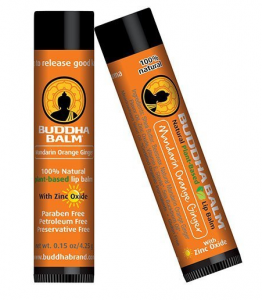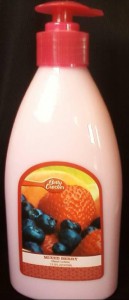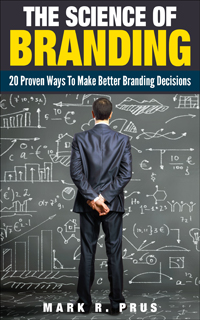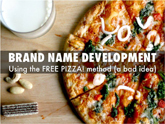Increase Recall of Your Message By…
Yes, I know the title of this post is incomplete. That is what this post is all about. Marketers know that “unfinished tasks” are the most memorable. Your brain seeks “cognitive closure” and so you will remember unfinished tasks until you complete them. This effect is called the Zeigarnik effect after Bluma Zeigarnik who studied this effect in the early 1900’s.
The first publication of the Zeigarnik effect in 1927 was based on Bluma’s observation of a waiter in the local beer garden who had an uncanny ability to remember the orders of multiple diners all the way through delivery of the meals. However, after the meal (once the waiter’s task was completed), the diners would cover up their plates and the waiter could not come close to recalling what the all the diners had ordered. Zeigarnik postulated that the waiter had extreme cognitive focus on the unfinished task that enhanced his recall, but once the meals were delivered that focus shifted elsewhere.
There are numerous studies validating this effect. My personal favorite is a recall test of advertising in which consumers watched a 30-minute TV show with ads for soft drinks, mouthwash and pain relievers (http://www.acrwebsite.org/search/view-conference-proceedings.aspx?Id=12042). In a crossover design, respondents sometimes saw ads that were full-length and sometimes saw ads that were clipped with the last 5 or 6 seconds missing. Researchers found that consumers remembered specific details about the unfinished ads significantly more than the finished ads in 3 different timeframes: immediately, 2 days later and 2 weeks later. Clearly lack of closure is a powerful tool in marketing!
So how can you use the Zeigarnik effect in your marketing? Well, you can’t just start showing ads that are clipped at the end and hope for the best.
One approach to leverage “the power of the incomplete” is to create “unfinished business” in the minds of your target market by igniting their curiosity. If your messaging causes a consumer to become curious about your product, it is likely that the person’s brain will view your messaging as an incomplete task that requires further investigation, which may lead to a Google search or click on your website. I discussed the science behind this approach in the first chapter of my branding book The Science of Branding: (www.amazon.com/Science-Branding-Proven-Better-Decisions-ebook/dp/B00TBOL6YA).
As an example, consider Buddha Balm Lip Balm. In my case, I was intrigued by the use of a key figure in Buddhism to sell something as trivial as lip balm. Buddha is recognized by Buddhists as an enlightened teacher who shares his insights to help others in their suffering. Turns out the lip balm is “designed to awaken the senses and promote awareness” and to “enhance lives and inspire positive emotional and physical well-being” so once I saw that connection I “completed the task” and was ready to move on. But I will remember Buddha Balm!
Unfinished business is something that your brain hates, so leverage the Zeigarnik effect in your marketing to engage your consumers!
Stealth Marketing: How Marketers Use Emotions To Sneak Their Messaging Past Your Brain’s Filters
When your brain uncovers new information, it says: “You Shall Not Pass!” Fans of “The Lord of The Rings” will recognize this as Gandalf’s quote (https://youtu.be/V4UfAL9f74I) or perhaps will recall its use in the “Forgetting Sarah Marshall” movie (https://youtu.be/l7Z05Fq2f58).
Your brain applies this gatekeeper logic to prevent itself from being overloaded by irrelevant information. Just image if you had to pay equal attention to every single stimulus the brain receives…you would be overwhelmed in minutes.
The brain has a well-defined way to deal with information from the environment1. It has strict criteria for allowing incoming information to flow and it effectively uses a three-stage process to filter out irrelevant information. Like the famous “Bridgekeeper” from the “Monty Python and the Holy Grail” movie (https://youtu.be/pWS8Mg-JWSg), the brain requires that information meet three challenges before it is stored in long term memory (and not forgotten).
Stage 1: Sensory Registration – This system filters incoming environmental information to determine how important it is. In milliseconds, the brain evaluates the sensory input and relates it to the individual’s past experiences to decide what to do with it. Most of the time it decides the input is unimportant so it ignores it. This is how you can read a book while your spouse watches television. But this system can also save you because it gives dangerous stimuli (like a gunshot) maximum focus and attention.
Stage 2: Immediate Memory – If the information gets past the sensory register (i.e., gets noticed) it will proceed into the first of two temporary memories where it will be assessed again. The first is called the immediate memory, and it holds information for up to 30 seconds while it decides what to do with it. If the information is deemed important, it will proceed to the next temporary memory. If not, the information will be forgotten. One of the most important functions of the immediate memory is to prioritize input. It is believed that there are 3 levels of priority:
1. Highest Priority = Survival – Data that concerns your survival will be given top priority and the information will be accompanied by a rush of adrenaline, causing a “fight or flight” response that shuts down all unnecessary activities and focuses the brain on the stimulus.
2. Second Priority = Emotions – Data that generates emotions will also be given high priority as portions of the brain will shut down to address the emotional stimulus. Powerful emotions like fear or anger can cause the brain to shut down the ability to talk (“I was dumbfounded”) or move (“I froze in place”). Interestingly, while strong emotional content can shut down conscious processing, it can also enhance the recall of the event by causing the release of hormones that stimulate the amygdala to signal brain regions to strengthen memory.
3. Third Priority = Everything Else – All other data falls to the bottom of the priority list. That does not mean this information is eliminated, but it certainly lessens the odds of generating strong impact in the brain.
Stage 3: Working Memory – If the information gets past the immediate memory, it will proceed into the working memory. The working memory is different because it is where conscious, rather than subconscious, processing occurs. Working memory is constrained by capacity which averages to roughly 7 “chunks” of information in working memory at a time. Working memory is also constrained by time, as testing has shown information can reside there for 10 to 20 minutes. During those 10 to 20 minutes the brain will decide whether to encode this information for long-term storage or forget it. Studies have shown there are two important factors for meeting the challenge for encoding and proceeding to long-term memory:
1. Does this information make sense? – The brain will draw upon past experiences to identify if this new information fits into the person’s understanding of the world. If it does, then it is likely to proceed. If it does not, it is likely to be forgotten.
2. Does this information have meaning? – Is this information relevant to the person? Again, the brain will compare prior experience to attempt to identify relevance. If the information is deemed relevant, it is likely to proceed. If not it is likely to be forgotten.
If the information passes the “make sense?” and “have meaning?” screens in the working memory, it is likely to be encoded for long-term storage by the hippocampus and sent to a retention area of the brain.
Summary: The Three Questions The Brain Asks:
1. Should I notice this?
2. Should I pay attention to this?
3. Should I remember this?
How does Stealth Marketing slide past the brain’s filters? Obviously the goal is to have the brain:
1. Notice Your Messaging
2. Pay Attention To Your Messaging
3. Remember Your Messaging
One simple way would be to make your messaging a “fight or flight” life-threatening risk. However, I suspect that a “buy this or die” pitch would not be conducive to building a long-term customer relationship.
A superior, “stealthy” way to pass the brain’s filters is to embed your messaging in emotion. Here is how emotional messaging gets past the brain’s filters:
1. Sensory Registration – Emotional content gets an automatic pass through the first filter. It will get noticed.
2. Priority Input Into Memory – Emotional content gets high ratings, after the “life or death” ranking of survival content
3. Successful Encoding Into Long-Term Memory – Because emotional content will likely pass the “make sense?” and “have meaning?” screens, it is likely to be encoded for long-term storage
So what does emotional marketing look like?
Southwest Airlines has understood the power of love for quite a while (e.g., their stock exchange ticker symbol is LUV), and their advertising campaign utilizes love in verbal and visual form to drive the “Southwest = Love” point home. Suburu is another company that leverages the power of love in their marketing, including the tagline of “Love. It’s What Makes a Suburu, a Suburu.” The scientific evidence about the persuasive power of love abounds.
Volvo is currently running a “Volvo Wedding” ad that is either very confusing or highly engaging depending upon how the emotional content hits you. Personally I found the :30 ad confusing (https://www.ispot.tv/ad/ASxb/2016-volvo-xc90-wedding-song-by-sharon-van-etten) but the long-form ad showed the full story (https://youtu.be/1Q0ePBvH18c). Your daughter’s wedding day is one of the most emotional days a father can experience, so all the Dads of daughters were no doubt paying attention.
So next time you see a marketer trying to tug at your emotional strings, recognize that they are just trying to get past the brain’s filters and make their messaging a long-term fixture in your head!
1Please note much of the technical information in this post is sourced from this outstanding book (you should buy it!): Sousa, David A. (2006). How the Brain Learns (3rd edition). Thousand Oaks, CA: Corwin Press
A Lesson In Reusing Historic Brand Names #TBT
The music streaming service Rhapsody just announced that they are rebranding themselves as Napster, a brand they acquired in 2011. Is bringing back this historic brand name a good idea?
Let me go on record as saying I’m a huge fan of leveraging existing brand equity in historic brand names. However, you must do this with extreme care because existing brand equity always includes baggage.
Here is an example of good baggage and bad baggage. At the North American International Auto Show in 2012, Chrysler/Fiat unveiled the 2013 Dodge Dart. This was not the first time Dodge returned to a historic nameplate rather than introduce a new name. A few years before Dodge reintroduced its muscle car as Dodge Challenger.
The new Dodge Dart was a great car. It used the mechanical platform of a vehicle by Alfa Romeo, a Fiat-owned brand in Europe. This Dart was loaded with technology and attention to detail that is not normally found in a compact car. The Dodge Challenger was also an excellent car.
But bringing back the Dodge Dart name was a poor choice, while reusing Dodge Challenger was a great choice. The existing brand equity on the name “Dodge Dart” was horrible. The existing brand equity on the name “Dodge Challenger” was perfect.
Did Chrysler/Fiat actually do any research on the equity present in the historic names? I doubt it. You can understand this if you ask a few friends 3 important things they recall about Dart and ask the same questions about Challenger:
1. Who owned the car?
2. What was their ownership experience like?
3. What is their lasting memory of the car?
The answers you are likely to get are as follows:
Who owned the car?
Dart = my grandmother; Challenger = my crazy, risk-taking uncle
Ownership experience?
Dart = she drove it to church on Sunday; Challenger = he drag raced it on the street
Lasting memory?
Dart = car rusted away in the driveway; Challenger = coolest car ever
As a result you will see why Chrysler/Fiat recycled Challenger as a muscle-car name. But you will be shaking your head over why Dart was the name for the new Chrysler/Fiat compact car.
Many who owned an original Challenger still regret the day they sold it. Many who owned an original Dart still regret the day they bought it. Sometimes it is far better to create a new name rather than to use an old one with baggage like that!
So it is no surprise that the new Dodge Dart has already been discontinued.
Napster? Have they done the necessary research to understand that brand name’s baggage? I certainly hope so…otherwise the name Rhapsody will be a fond memory of people who used to work at the music streaming service as Napster gets discontinued.
Fictitious Versus Fake Branding
Creating fictitious names for products is standard practice in many industries. Creating a brand that evokes a certain image or feeling is so commonplace that most of us don’t think twice about it.
Consider Genova Tonno. In the Italian language, Genova is the city of Genoa, and Tonno is tuna. So you might infer that a can of Genova Tonno contains tuna caught in the waters off Genoa. Actually, Genova Tonno is a specialty brand of tuna owned by Chicken of the Sea. The label says:
Genova Tonno© Premium Yellowfin Tuna. Wild caught from deep waters, Genova Select Yellowfin is all natural with no additives or preservatives. Genova is packed in the Mediterranean tradition with olive oil, which provides a rich and delicious flavor.
Chicken of the Sea is owned by a Thai-based company called Thai Union, which has its own packing facilities in Thailand. While the source of its tuna is never identified beyond “deep waters” it is believed that those deep waters are not off the coast of Italy, but rather are off the coast of Thailand.
By all reports, this is very tasty tuna. Do you really care that the manufacturer is positioning its product as being Italian when its heritage is clearly not Italian? If so, perhaps you should buy Asdomar which claims that its tuna is “100% processed in Italy.” Note: even this does not mean that all of their tuna is caught near Italy
Need another example? Would you be upset to know that Häagen-Dazs was born in the Bronx, New York in 1961? Its creators were not Scandinavians but rather two Polish immigrants, Reuben and Rose Mattus. Why did they choose the name Häagen-Dazs? The name was created to look Scandinavian for Americans because the European cachet radiates craftsmanship, tradition, and wholesomeness, thereby justifying the higher price.
Recently in the UK, Tesco has been drawing flak from consumers because they created seven fictitious farm names and are using them in marketing their products. Fake farm names such as Rosedene and Nightingale now provide a cachet to their product lines.
“Authenticity” is a traditional buzzword for marketing. Studies have shown that brands should be authentic to build trust among consumers. At what point does a “fictitious” name cross the “authenticity line” and become a “fake” name?
The Tesco example shows one flash point is food sourcing. Consumers want to know where their food comes from and apparently once people discover that “Rosedene Farms” isn’t a real place they no longer trust that those apples sold under that brand name are of high quality. Critics in the UK are calling this practice “legal deception.”
The US Patent and Trademark Office has a fairly broad definition of what they consider to be “legal deception” in geographic names. The policy of a name being “geographically deceptively misdescriptive” would prevent the registration of such a trademark. According to the USPTO website, “A mark will be refused as primarily geographically deceptively misdescriptive if: (1) the primary significance of the mark is geographic; (2) purchasers would be likely to think that the goods or services originate in the geographic place identified in the mark, i.e., purchasers would make a goods/place or services/place association; and (3) the goods or services do not originate in the place identified in the mark.”
That would seem to indicate that Tesco might be facing some storm clouds on the horizon if they try to register their set of “fake farm names” in the US.
Perhaps I am immune to this issue because I am a professional name developer with 25+ years of experience as a consumer products marketer. I long ago stopped losing sleep over the fact that Betty Crocker isn’t a real person!
Blink Versus Think – Which Branding Approach Is Better?
Sometimes a company will choose a “Blink” name for its product or service. Blink names are simple, straightforward and usually descriptive of what the product is or does. For example, you don’t have to think a lot about the name Zyliss gave their food chopper: Easy Chop, which pretty much says everything you need to know about this product. It easily chops food.
Malcolm Gladwell wrote Blink which covered in detail those decisions made in an instant. Gladwell’s premise is that in seconds a person can form an intuitive first impression that can be more valid than a carefully considered, well-thought-out, researched conclusion. Your unconscious brain takes over, which is exactly what happens with a Blink name. Your brain says “got it, now move on” in a matter of seconds.
Blink names are quite popular because companies want to save money in marketing their brands. Clients who choose a Blink name are essentially saying “I don’t have a lot of money to create meaning for a name, so I’m going to choose a name that is so simple even a caveman could get it instantly.” Blink names are like “tequila shots” as they are simple, quick and effective.
But there are a few issues with Blink names. First of all, you generally will have little differentiation by using a Blink name. As proof, here are a few competitors of the Easy Chop food chopper:
Easy Chopper
Quick Chop
Turbo Chop
Turbo Chopper
Not only is this a trademark minefield, there is the potential for substantial consumer confusion. Imagine your customer going to the store and looking for the Easy Chop product. Because the name is a generic description of the product function, he/she may get lost in the competitive confusion and end up buying the wrong product.
Another problem with Blink names is the potential for lack of registration in long-term memory. If the name of your product or service gets the “Blink treatment” it may be in and out of the brain so quickly that it just does not register, and therefore won’t be available for recall later when your customer is shopping.
“Think” names are different. A Think name causes you to pause and consider it because the meaning of the name is deeper than a Blink name. Think names engage the brain in a way that enhances memorability. They are like the “single malt scotch” that you savor and enjoy as it unfolds.
Sticking with the food chopper category, consider the name The Pampered Chef uses for its food chopper: Cutting Edge. This name is a Think name because it causes you to think about how a futuristic term (e.g., the cutting edge of technology) can apply to a mundane product such as a food chopper. By making an in-depth connection (something like: cutting edge => high tech => better design => improved performance => Cutting Edge food chopper is better), your brain has expended a sufficient amount of effort to store away the complex meaning behind the name, which enhances recall and persuasion for the product.
Think names generally require more marketing investment to register in the minds of consumers. To get Monster.com established as a premier job hunting site took a lot more investment than JobHunt.com.
But don’t go too far with Think names. If you make people work too hard to get the meaning behind the name, you will lose them and perhaps even anger them. In the food chopper category, the Starfrit Swizzz Prozzz Chopper is a great example of this. Sure, the name stands out because the use of “-zzz” is quite unusual, but “-zzz” does not have a lot of relevance for food choppers (certainly not as much as it does for sleep products, e.g., ZzzQuil® sleep aid). People will think about the name but in the end will decide it does not make sense, so they will reject it.
In my book, The Science of Branding, I discussed a study in The Journal of Consumer Research in 2005 where the researchers looked at the impact of Think names (aka ambiguous names). The researchers used crayon colors as a proxy for the trend in ambiguous brand names in all types of product categories (such as Ben & Jerry’s Chubby Hubby ice cream). The standard Crayola® Crayon color palette contains over 130 colors including ambiguously named colors such as purple heart, razzmatazz, and fuzzy wuzzy brown. The researchers developed a 2×2 grid for categorizing color names based on whether they are typical or atypical and specific or unspecific. The resulting categorization put the Crayola names into 4 categories:
Common (typical, unspecific; e.g., dark green, light yellow)
Common Descriptive (typical, specific; e.g., pine green, lemon yellow)
Unexpected Descriptive (atypical, specific; e.g., Kermit green, rainslicker yellow)
Ambiguous (atypical, unspecific; e.g., friendly green, party yellow)
The researchers then measured how the names impact consumers’ product perceptions and purchase intentions. The results suggest that color names can influence purchase intent, and that this effect is related to the typicality and specificity (or lack thereof) of the names. In general, consumers preferred ambiguous names to plain descriptive names. But completely ambiguous names without some reference (e.g., Party Yellow) can be very confusing to consumers unless there is additional information provided.
The scientists speculate that the use of ambiguous and unexpected names creates a “mind puzzle” that the customer will have to solve. When the customer makes the connection and understands why the name was chosen, he/she will have higher recall of the name and positive attributions to the product. If you use a slightly ambiguous name, the consumer might actually enjoy the “mind puzzle” and won’t have to work too hard to get your point. When consumers solve the puzzle, they will then have a sense of accomplishment because they were able to figure it out. However, if you use a truly ambiguous name (such as Party Yellow), consumers may just get frustrated, confused and move on.
While I am an advocate for Think names, I recognize that certain situations might require a Blink name. If you are using a Blink name, you need to ensure that your customer sees the branding in a way that makes it stand out from the crowd and be recognized. For example, consider the Slap Chop food chopper. The Slap Chop name by itself might be perceived as a Blink name because that is how you operate hand choppers…you slam down the chopping mechanism onto the item you are chopping. But what makes the Slap Chop product stand out is its infomercial. Once you’ve seen it you won’t forget the name.
Get The Target Right
When a prospective client tells me that his/her product is “meant for everyone” I have to bite my tongue. You cannot target everyone. But that does not stop clients from trying to do so!
The main reason clients want to target everyone is they do not want to eliminate any customers from consideration. Let’s be clear – picking a target market is not about refusing to sell to anyone. Rather, it is all about deciding how to position your business and making sure that the right messages are delivered to the right consumers at the right time.
The other end of the targeting spectrum is “me,” as in clients who say that their product is for “people like me.” There is only one person like “me” and a target market of one person won’t generate a lot of business.
So how do you find your ideal target market somewhere between “me” and “everyone?”
The rule of thumb is to identify the smallest possible group of people who are united by some commonalities that will cause them to be motivated by your messaging. If you have a concise, well-defined target market you will be able to consistently delight your customers by providing them with meaningful value that meets their specific needs.
I’m an advocate of consumer research to gain an understanding of your target market. By asking the right questions, you can gain an in-depth understanding of the customers who are most likely to be attracted to your product. You need to gather customer demographics (e.g., gender, age, income, geographic location, etc.), beliefs (e.g., attitudes and behaviors), and a basic understanding of their “story” (motivations and concerns). Done correctly, research can provide a very specific understanding of your target market’s goals and challenges, and an understanding of how your product or service can help them, which will be an invaluable resource when developing your messaging.
Failing to identify the proper target market can be a multi-billion dollar mistake. Here is an example where better targeting could have resulted in billions of dollars:
Roy Raymond had an embarrassing experience trying to buy lingerie for his wife in 1977, so he decided to launch a lingerie shop geared toward men to make them more comfortable in buying lingerie. While his Victoria’s Secret store led to a multi-million dollar business, he missed the multi-billion dollar opportunity in lingerie. Despite his successful launch of a lucrative retail concept and expansion to a mail-order catalog business, he was selling to the wrong target audience for the wrong reasons. Women buy way more lingerie than men do, and the primary reason lingerie is purchased is not to make men happy, but rather because it makes women feel more confident. When Victoria’s Secret fell on hard times, Leslie Wexner (CEO of The Limited) bought the business and totally repositioned the company and its products to women. Today Victoria’s Secret is a multi-billion dollar megabrand.
I strongly encourage clients to thoroughly understand their target market before spending significant effort in marketing.
Get A Small Idea!
As we begin the New Year, many entrepreneurs are looking for “the next big idea” for 2016, as in trying to find “the next Google.” How about trying to find “the next small idea” instead?
When introducing a new product or service it is usually best to think small. Thinking small requires you to be more focused and to develop a very simple idea. It also is a more budget-friendly approach to development.
Some of the best-tasting sauces are made through the process of reduction, where you simmer or boil a liquid mixture (such as wine plus seasonings) in order to thicken the sauce and intensify its flavors. When the sauce is reduced by half or two-thirds, you get a great-tasting sauce!
Developing a small idea can be done in the same manner. Identify a “pain point” for your target market, then “reduce” the idea by removing layers or steps or cutting out useless factors. By reducing the idea to its smallest essence, you’ll often find a narrowly defined need that gives your target market a real reason to buy. Once you have a small idea you’ll discover that developing messaging for this passionate consumer is also simple and straightforward.
Finally, developing a small idea often enables you to be #1, even if it is within a small group or category of product ideas. Becoming the #1 brand can lead to a very deep connection with a passionate target audience. When those passionate customers become evangelists for your brand, you may experience exponential growth in your business. In the end, you may end up with the next Google, but only if you start small!
Worst Line Extension Name Ever?
Betty Crocker Lotion. Need I say more? This product is insane on two levels.
First of all, the person at General Mills who allowed a license to use the Betty Crocker name on a lotion product should be fired. Why would you risk the damage to a great brand name that has been used since 1921 in products that create “…convenient, delicious meals and easy-to-make, great-tasting desserts” (from the General Mills website)?
Second, the company that licensed the name Betty Crocker for use on a lotion should be forced to sit through a week of focus groups with American women evaluating this idea. I can assure you that the result of every focus group will be a brutal assessment that will be quite painful to watch.
Sometimes name development produces brand names that are subject to interpretation, but in this case, the name is so bad that the results can be predicted with near certainty. Betty Crocker Lotion is being sold in dollar stores most likely as a way to get rid of excess product that did not sell at retail.
How The Clouds Got Their Names
One of the websites I read regularly had this article about “How The Clouds Got Their Names.” Fascinating. Check it out!
Weather Channel Releases Names For 2015-16 Winter Storms
I’m a big fan of naming hurricanes. A hurricane is a large and significant weather system that can cause a huge loss of life and money. Naming a hurricane can provide a shortcut that leads to better communication about the danger. And besides, we humans like to have a “person” to blame. There aren’t many people in New Orleans who can say the name Katrina without cringing.
I’m not a fan of naming winter storms. The Weather Channel started naming winter storms three years ago because they felt that “…naming the storms will result in clearer communication about the systems.” Or maybe will increase ratings. Or gain sponsorships. I’m not sure which is the right reason, but I don’t like the idea of naming a snowstorm. It’s just a snowstorm already!
The Weather Channel has just released their names for 2015-16 winter storms. There are 26 names in total. They have continued their theme of using mythological names which is not surprising since “The Bozeman, Montana, High School Latin class, which provided the 2013-2014 list of winter storm names, also contributed to the 2015-2016 list.”
Here is the complete list:
http://www.weather.com/storms/winter/news/winter-storm-names-2015-2016
I do appreciate the difficulty of coming up with unique names for each letter of the alphabet. But seriously, winter storm YOLO? They explain this one as: “An acronym for you only live once. The modern version of the Latin phrase, carpe diem, which is usually translated seize the day.”
Thanks Weather Channel. Is this a secret message to weather-weary Northeasterners to “MOVE SOUTH?” By the time we get to Y we will be on the 25th winter storm. I know that YOLO will definitely reinforce that message in my brain!







